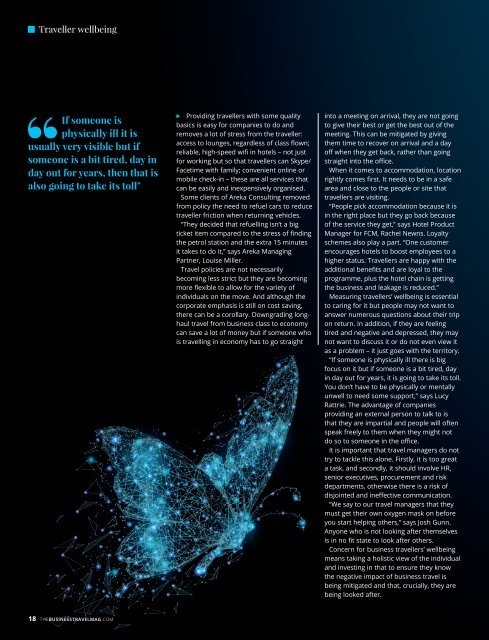You also want an ePaper? Increase the reach of your titles
YUMPU automatically turns print PDFs into web optimized ePapers that Google loves.
Xxxxxxx <strong>Travel</strong>ler Xxxxxxxx wellbeing<br />
If someone is<br />
physically ill it is<br />
usually very visible but if<br />
someone is a bit tired, day in<br />
day out for years, then that is<br />
also going to take its toll"<br />
Providing travellers with some quality<br />
basics is easy for companies to do and<br />
removes a lot of stress from the traveller:<br />
access to lounges, regardless of class flown;<br />
reliable, high-speed wifi in hotels – not just<br />
for working but so that travellers can Skype/<br />
Facetime with family; convenient online or<br />
mobile check-in – these are all services that<br />
can be easily and inexpensively organised.<br />
Some clients of Areka Consulting removed<br />
from policy the need to refuel cars to reduce<br />
traveller friction when returning vehicles.<br />
“<strong>The</strong>y decided that refuelling isn’t a big<br />
ticket item compared to the stress of finding<br />
the petrol station and the extra 15 minutes<br />
it takes to do it,” says Areka Managing<br />
Partner, Louise Miller.<br />
<strong>Travel</strong> policies are not necessarily<br />
becoming less strict but they are becoming<br />
more flexible to allow for the variety of<br />
individuals on the move. And although the<br />
corporate emphasis is still on cost saving,<br />
there can be a corollary. Downgrading longhaul<br />
travel from business class to economy<br />
can save a lot of money but if someone who<br />
is travelling in economy has to go straight<br />
into a meeting on arrival, they are not going<br />
to give their best or get the best out of the<br />
meeting. This can be mitigated by giving<br />
them time to recover on arrival and a day<br />
off when they get back, rather than going<br />
straight into the office.<br />
When it comes to accommodation, location<br />
rightly comes first. It needs to be in a safe<br />
area and close to the people or site that<br />
travellers are visiting.<br />
“People pick accommodation because it is<br />
in the right place but they go back because<br />
of the service they get,” says Hotel Product<br />
Manager for FCM, Rachel Newns. Loyalty<br />
schemes also play a part. “One customer<br />
encourages hotels to boost employees to a<br />
higher status. <strong>Travel</strong>lers are happy with the<br />
additional benefits and are loyal to the<br />
programme, plus the hotel chain is getting<br />
the business and leakage is reduced.”<br />
Measuring travellers’ wellbeing is essential<br />
to caring for it but people may not want to<br />
answer numerous questions about their trip<br />
on return. In addition, if they are feeling<br />
tired and negative and depressed, they may<br />
not want to discuss it or do not even view it<br />
as a problem – it just goes with the territory.<br />
“If someone is physically ill there is big<br />
focus on it but if someone is a bit tired, day<br />
in day out for years, it is going to take its toll.<br />
You don’t have to be physically or mentally<br />
unwell to need some support,” says Lucy<br />
Rattrie. <strong>The</strong> advantage of companies<br />
providing an external person to talk to is<br />
that they are impartial and people will often<br />
speak freely to them when they might not<br />
do so to someone in the office.<br />
It is important that travel managers do not<br />
try to tackle this alone. Firstly, it is too great<br />
a task, and secondly, it should involve HR,<br />
senior executives, procurement and risk<br />
departments, otherwise there is a risk of<br />
disjointed and ineffective communication.<br />
“We say to our travel managers that they<br />
must get their own oxygen mask on before<br />
you start helping others,” says Josh Gunn.<br />
Anyone who is not looking after themselves<br />
is in no fit state to look after others.<br />
Concern for business travellers’ wellbeing<br />
means taking a holistic view of the individual<br />
and investing in that to ensure they know<br />
the negative impact of business travel is<br />
being mitigated and that, crucially, they are<br />
being looked after.<br />
18 THEBUSINESSTRAVELMAG.COM

















